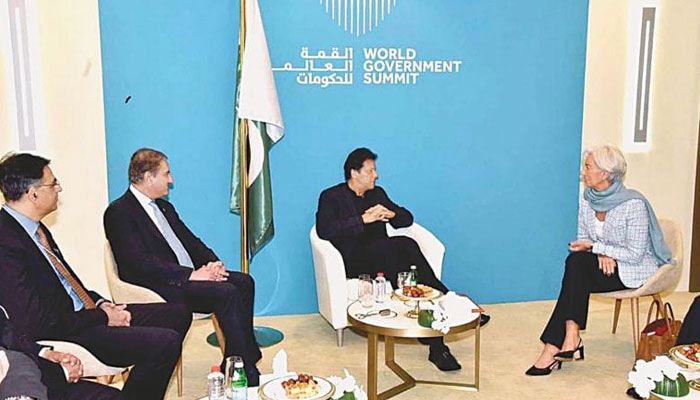Pakistan balks at IMF demands over $6 billion loan
Islamabad: Talks between Pakistan and the IMF to restart a $6b loan programme have stalled over Prime Minister Imran Khan’s refusal to introduce unpopular measures, say senior government officials.
Formal discussions to release a tranche of funding have been pushed back over concerns from Islamabad that instituting the reforms tied to the loan would provoke a backlash from the hard-hit middle class.
An IMF team that was expected to visit Islamabad in October has not yet arrived “as the fund is waiting to know if we are willing to take other steps to reduce the [fiscal] deficit”, said one of the officials.
“In view of coronavirus this year, our economy continues to underperform. Tax revenues are down,” he added.
The sticking points between Islamabad and the IMF on resuming the programme include raising electricity tariffs, higher tax collection targets and increasing the repo rate, which was lowered to 7 percent in June from 13.25 percent earlier in the year.
Pakistan’s economy has not suffered as big of a shock from the pandemic as neighbouring India. The Asian Development Bank projected that the economy would contract 0.4 percent in 2020 but would expand 2 percent next year. PM Khan has spurred growth by unveiling large incentives for the construction sector.
But analysts said Pakistan needed to enter the IMF programme to meet its debt repayments and unlock more funds from international financial institutions, such as the World Bank, as well as complete a planned $1billion eurobond.
Pakistan’s external debt and liabilities have grown from $95bn in 2018 to almost $113bn in 2020, with a subsequent rise in debt servicing, according to the State Bank of Pakistan in its annual report released on Wednesday.
“We are in a debt trap that is entirely of our own making. It is a risk to our national security,” said the Institute for Policy Reforms, a Lahore-based think-tank.
Sakib Sherani, an economist and former adviser to the finance ministry, said protests launched by Pakistan’s opposition parties against Khan “have made it more difficult for the government to adopt unpopular measures. Tough reforms are always painful. Right now is not a good time for painful measures.”
Miftah Ismail, a former finance minister and opposition leader, said that an agreement forged by Khan and the IMF to reduce the fiscal deficit appeared to be unravelling. “A plan for reforming the tax collection system so far does not appear to be working,” said Ismail.
Pakistan is under additional pressure after Saudi Arabia demanded $1bn repayment of part of a $3billion loan and froze an oil credit facility worth more than $3 billion. Officials in Islamabad said there were concerns that Riyadh might ask for even more. That would force Pakistan to seek further loans from China.
“Imran Khan would not be so keen on a [fiscal] tightening again, especially when you factor in that there is political pressure,” said Ali Farid Khwaja, an analyst at brokerage Khadim Ali Shah Bukhari Securities in Karachi, “but going into an IMF programme is critical.” A government official told the Financial Times that Pakistan was hoping to resume talks by the end of November, but there had been no confirmation from the IMF. —The Financial Times Limited 2020
-
 Chris Hemsworth Gets Candid About Daughter’s Drawings That Inspired Several Of His Tattoos
Chris Hemsworth Gets Candid About Daughter’s Drawings That Inspired Several Of His Tattoos -
 UK To Experience Rare 'Blood Rain' On Tuesday Feb. 24, 2026: Know Every Detail
UK To Experience Rare 'Blood Rain' On Tuesday Feb. 24, 2026: Know Every Detail -
 Maria Shriver Shares Heartbreaking Reminder After Eric Dane's Death: 'Next Week Isn't Guaranteed'
Maria Shriver Shares Heartbreaking Reminder After Eric Dane's Death: 'Next Week Isn't Guaranteed' -
 Andrew Mountbatten Windsor Gets New Moniker After Losing ‘Prince’ Title
Andrew Mountbatten Windsor Gets New Moniker After Losing ‘Prince’ Title -
 Jack Black Shares Unseen Moments With Tanya Haden: 'My Love'
Jack Black Shares Unseen Moments With Tanya Haden: 'My Love' -
 Shamed Andrew Made Taxpayers Fund Personal ‘massages’
Shamed Andrew Made Taxpayers Fund Personal ‘massages’ -
 What Could Be Nick Reiner's Fate After Pleading Not Guilty Parents’ Murder Case?
What Could Be Nick Reiner's Fate After Pleading Not Guilty Parents’ Murder Case? -
 Princess Kate Talks About 'hard Conversations' With Kids Amid Andrew Drama
Princess Kate Talks About 'hard Conversations' With Kids Amid Andrew Drama -
 Prince William Mocked For Being ‘most Reluctant’ King-in-waiting
Prince William Mocked For Being ‘most Reluctant’ King-in-waiting -
 Prince William Makes Rare Admission After Andrew Arrest
Prince William Makes Rare Admission After Andrew Arrest -
 ‘Got A Lot Of People Gunning For Me’: Trump Makes First Comments On Mar-a-Lago Intruder
‘Got A Lot Of People Gunning For Me’: Trump Makes First Comments On Mar-a-Lago Intruder -
 What Countries Have A Say In Andrew Removal From Line Of Succession?
What Countries Have A Say In Andrew Removal From Line Of Succession? -
 How Did Luci4 Die? Police Probes 'BodyPartz' Sudden 'suspicious' Death
How Did Luci4 Die? Police Probes 'BodyPartz' Sudden 'suspicious' Death -
 King Charles Criticized By Princess Anne Over Andrew Drama
King Charles Criticized By Princess Anne Over Andrew Drama -
 Kelly Osbourne Hits Back At 'absolutely Devastating' Body Shaming Comments
Kelly Osbourne Hits Back At 'absolutely Devastating' Body Shaming Comments -
 Hailee Steinfeld Details Preparations Ahead Of Welcoming First Kid With Josh Allen
Hailee Steinfeld Details Preparations Ahead Of Welcoming First Kid With Josh Allen




